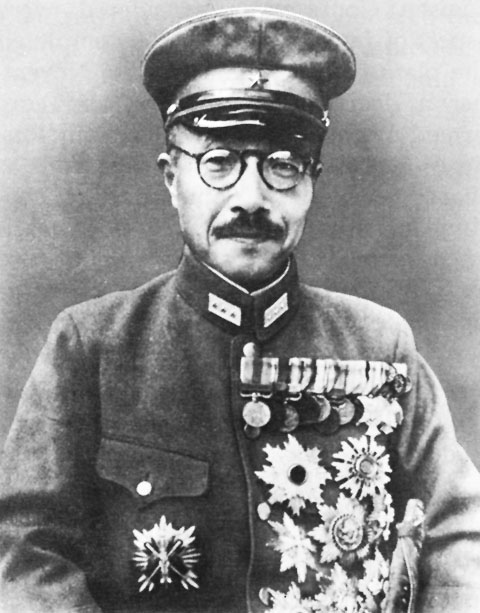 |
| Hideki Tōjō, Japanese Prime Minister (1941-44) and Minister of War (1940-44) (wikipedia). |
The Nomonhan Incident ended on the 15th September 1939 as a result of a humiliating Japanese defeat against the Soviets. This loss raised a discussion in the core of the Japanese leading officers, about if they should keep pursuing their north expansion plans (Hokuhin-ron) or switch their focus to the south (Nanshin-ron) instead.
The end of the Nomonhan incident coincided in time with the German invasion of Poland, which was followed by the German invasion of France a year later. During this time, the Nanshin-ron was the leading policy in Japan, still fighting China in the Second Sino-Japanese War. The lack of progress in China led to the Japanese invasion of the whole French Indochina in July 1941. This invasion, due to the weakness of the French, the British and the Dutch after the war in Europe, would help to cut off foreign aid supply to China and enable the creation of a Southern front.
 |
| IJA 5th Division during the invasion of French Indochina (commons.wikimedia.org) |
The United States government reacted then by establishing an oil and other raw materials embargo to Japan which was to be followed also by Britain, the Netherlands and China. As Japanese economy and industry relied on oil import, this sanction was thought to stop Japanese expansionism. However, in Japan it was viewed as an intolerable offense, and plans to invade the rich in oil but now weakly defended Dutch East Indies (today's Indonesia) were developed.
At the same time, Operation Barbarossa (German invasion of Russia) was successfully going on for the Germans who were already far east in Soviet territory by July 1941. The Germans were pushing their Japanese allies to launch an offensive against the Soviet Far East border. Despite the critical situation the Soviets were facing in the west, around one fifth of Soviet ground forces and one third of Soviet tanks were held in the east to defend the expected Japanese attack.
 |
| German Panzers in Soviet territory, Operation Barbarossa 1941 (Britannica.com) |
So the Japanese were faced with a dilemma: expand south to the Dutch East Indies which would probably lead to war against the United States, or attack the Soviet Union and take the Siberian oil fields. The outcome of the Nomonhan incident, still vivid in the Japanese memory two years later, was one of the main reasons why the first option was chosen.
News of the decision of not to attack the Soviet Union reached the Soviets thanks to their spy in Tokyo Richard Sorge, just when the German army was at the doors of Moscow. The Soviets then decided to transfer fifteen infantry divisions, 1700 tanks and 1500 aircraft from the Far East to the Moscow front. These fresh units were crucial to turn the tide of the Battle of Moscow and of the whole war.
 |
| Soviet T-26 light tank during the Battle of Moscow (commons,wikimedia.org). |
If the outcome of the Nomonhan incident had been a Japanese victory or even a slim defeat, the whole development of World War II could have been different. Given the precarious Soviet situation in the Autumn of 1941, if Japan had attacked them, it seems highly unlikely that the Soviets could have maintained a two front war. Even if they could have stopped the Japanese attack, the lack of reinforcements in the western front could have lead to the fail of Moscow, and since it was the center of the Soviet transportation system, it is likely that after the fall of Moscow and facing Japan on the other side would have lead to the collapse of the Soviet Union and the German control over virtually all Europe.
But that is not what happened. On December 6, when the Germans were just a few miles out of Moscow, Soviet hero Georgy Zhukov launched a counteroffensive, spearheaded by the fresh reinforcements from the Far East, which succeeded to push back the German line about a hundred miles. On December 7, Japan attacked Pearl Harbor in an attempt to weaken the American fleet in the Pacific and gain time to take their desired areas in South East Asia, build a defensive perimeter and negotiate a treaty with the US before they could be ready to hit back. US declared war to Japan on December 8th, and Germany declared war to the US on December 11th, which was contested with a war declaration by the US.
_burning_after_the_Japanese_attack_on_Pearl_Harbor_-_NARA_195617_-_Edit.jpg) |
| USS Arizona burning during the attack on Pearl Harbor (wikipedia.org). |
This was perhaps the most decisive week of the war, the week that brought the United States to war both in Europe and in the Pacific, the week that changed the fate of the world. And it was directly influenced by the Nomonhan incident.
Sources:
The great book linked below deeply investigates the Nomonhan incident and the consequences it had in the development of WWII.

No comments:
Post a Comment
Note: Only a member of this blog may post a comment.